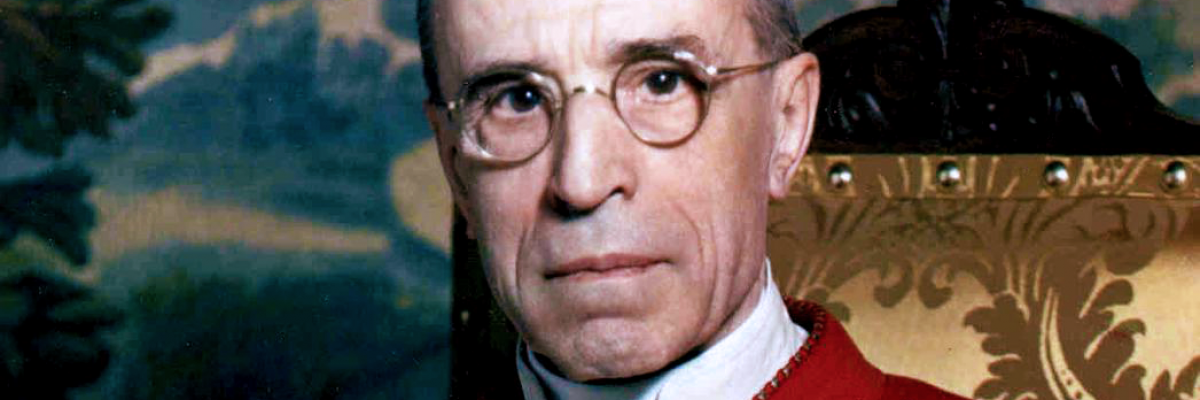
After a good number of years as a Catholic apologist, having found myself in the same kinds of situations over and over again, I had a “first time” experience. I was asked to speak to a Jewish group about Pope Pius XII and his actions (and supposed inactions) before and during World War II.
We sat in a large circle, the two dozen or so of us who met in the community room at a mall. I presumed nothing on the part of my listeners except that they probably were not familiar with my profession. I said that a Catholic apologist is not someone who goes about apologizing for being a Catholic. An apologist is someone who gives an explanation or defense of the Faith, and that is what I proposed to do regarding Pius XII. I proposed to explain to these somewhat skeptical people that what they had been led to believe about that pope just wasn’t so.
Early life of the pope
I began my story with an account of Eugenio Pacelli’s life, particularly his years as papal nuncio to Germany. I went through a long chronological list of his anti-Nazi comments and activities prior to his accession to the papal throne—how, for instance, as early as 1922 he was terming Hitler “obsessed” (this was a year before the attempted Nazi putsch in Bavaria). I noted that Cardinal Pacelli was the chief editor of Mit Brennender Sorge, the anti-Nazi encyclical issued by Pius XI in 1937, the only encyclical to have been issued in German.
As I went through my list, I could sense my listeners’ surprise. I almost could hear their thoughts: “The pope said that against the Nazis? He condemned them so early, so long before other leaders did? He did that to oppose them—even including cooperation in early conspiracies to overthrow Hitler?”
When I discussed John Cornwell’s book Hitler’s Pope—a truly dishonest work of sham scholarship—and read to them the line that is Cornwell’s most compelling argument against Pius XII, they were nonplussed. The line comes from a letter signed by then-Msgr. Pacelli in 1919 and supposedly shows that Pacelli harbored anti-Semitic sentiments.
The letter discusses Bolshevik revolutionaries in Germany and identifies one as a Russian Jew whose appearance was unkempt and who speech was coarse. “That’s it?” one of my listeners interjected. “I see nothing wrong with that.” No one else in the group seemed to find in that single sentence any semblance of anti-Semitism. All they found was a description of an unattractive revolutionary who happened to be Russian and Jewish.
The World War II years
Then to the war years. I went month by month, showing how Pius XII—he became pope six months before hostilities broke out—was ceaseless in his solicitude for persecuted Jews. I reviewed the plaudits he received during and after the war from Jewish leaders, such as future Israeli prime minister Golda Meir, and from Jewish scholars, such as historian Pinchas Lapide, who credited the pope with saving 860,000 Jewish lives.
I even mentioned a sensitive point: the conversion of the chief rabbi of Rome to Catholicism. Israel Zolli had led the Roman Jews in the 1930s. He became friends with the future Pius XII and appreciated the Cardinal’s solicitude for the Jews. After the war Zolli became a Catholic, and at his baptism he took as his name Eugenio, the pope’s own given name.
“How could Zolli do that,” I asked, “if he harbored even the least suspicion that Pius had left something undone in trying to alleviate the persecutions?” I suppose my Jewish listeners were not pleased to learn of a rabbi who became a Christian, but they seemed to accept that Zolli’s story undercuts claims of the pope’s disregard for or antagonism toward the Jews.
I wrapped up with a brief discussion of Rolf Hochhuth’s 1963 play The Deputy. Produced five years after Pius XII’s death, it was the first major blast against him. It has been the main vehicle for the spread of the myth of the pope’s vacillation. Hochhuth, by the way, for all the bias in his play, did not accuse Pius XII of anti-Semitism but of moral weakness, lack of backbone. Only much later did writers such as Cornwell begin to claim that Pius harbored animosity toward Jews.
Sins of the fathers
After my remarks came a discussion period. Several people said, in essence, “Yes, I can accept all you say, and I am pleased to learn what Pius XII did, but I remain wary of the Catholic Church because of what happened to my people in the Middle Ages.” This wariness is the burden of history, even when it is a history of actions that the Church, in those very centuries, opposed.
Among my listeners there was an intellectual willingness to distinguish between the Church’s teachings and the actions of some of her wayward members, but there was an affective incapacity to do so. They could accept all that I said, thus exonerating Pius XII, but still there remained a wariness concerning the Church and, derivatively, of Catholics.
In years past, whether a lifetime ago or a millennium ago, some Catholics failed to live up to the teachings of their Church and left the ancestors of these Jews with a negative impression of what it meant to be a Christian. That impression has been handed down, generation to generation. Fair? Maybe not, but that is what has happened. The sins of the fathers have been visited on the sons.



